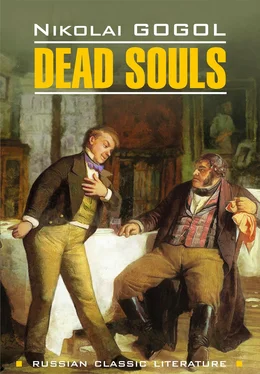Николай Гоголь
Мёртвые души / Dead Souls
© КАРО, 2017
Все права защищены
To the door of an inn in the provincial town of N. there drew up a smart britchka – a light spring-carriage of the sort affected by bachelors, retired lieutenant-colonels, staff-captains, land-owners possessed of about a hundred souls, and, in short, all persons who rank as gentlemen of the intermediate category. In the britchka was seated such a gentleman – a man who, though not handsome, was not ill-favoured, not over-fat, and not over-thin. Also, though not over-elderly, he was not over-young. His arrival produced no stir in the town, and was accompanied by no particular incident, beyond that a couple of peasants who happened to be standing at the door of a dramshop exchanged a few comments with reference to the equipage rather than to the individual who was seated in it. “Look at that carriage,” one of them said to the other. “Think you it will be going as far as Moscow?” “I think it will,” replied his companion. “But not as far as Kazan, eh?” “No, not as far as Kazan.” With that the conversation ended. Presently, as the britchka was approaching the inn, it was met by a young man in a pair of very short, very tight breeches of white dimity, a quasi-fashionable frockcoat, and a dickey fastened with a pistol-shaped bronze tie-pin. The young man turned his head as he passed the britchka and eyed it attentively; after which he clapped his hand to his cap (which was in danger of being removed by the wind) and resumed his way. On the vehicle reaching the inn door, its occupant found standing there to welcome him the polevoi, or waiter, of the establishment – an individual of such nimble and brisk movement that even to distinguish the character of his face was impossible. Running out with a napkin in one hand and his lanky form clad in a tailcoat, reaching almost to the nape of his neck, he tossed back his locks, and escorted the gentleman upstairs, along a wooden gallery, and so to the bedchamber which God had prepared for the gentleman’s reception. The said bedchamber was of quite ordinary appearance, since the inn belonged to the species to be found in all provincial towns – the species wherein, for two roubles a day, travellers may obtain a room swarming with black-beetles, and communicating by a doorway with the apartment adjoining. True, the doorway may be blocked up with a wardrobe; yet behind it, in all probability, there will be standing a silent, motionless neighbour whose ears are burning to learn every possible detail concerning the latest arrival. The inn’s exterior corresponded with its interior. Long, and consisting only of two storeys, the building had its lower half destitute of stucco; with the result that the dark-red bricks, originally more or less dingy, had grown yet dingier under the influence of atmospheric changes. As for the upper half of the building, it was, of course, painted the usual tint of unfading yellow. Within, on the ground floor, there stood a number of benches heaped with horse-collars, rope, and sheepskins; while the window-seat accommodated a sbitentshik, cheek by jowl with a samovar – the latter so closely resembling the former in appearance that, but for the fact of the samovar possessing a pitch-black lip, the samovar and the sbitentshik might have been two of a pair.
During the traveller’s inspection of his room his luggage was brought into the apartment. First came a portmanteau of white leather whose raggedness indicated that the receptacle had made several previous journeys. The bearers of the same were the gentleman’s coachman, Selifan (a little man in a large overcoat), and the gentleman’s valet, Petrushka – the latter a fellow of about thirty, clad in a worn, over-ample jacket which formerly had graced his master’s shoulders, and possessed of a nose and a pair of lips whose coarseness communicated to his face rather a sullen expression. Behind the portmanteau came a small dispatch-box of redwood, lined with birch bark, a boot-case, and (wrapped in blue paper) a roast fowl; all of which having been deposited, the coachman departed to look after his horses, and the valet to establish himself in the little dark anteroom or kennel where already he had stored a cloak, a bagful of livery, and his own peculiar smell. Pressing the narrow bedstead back against the wall, he covered it with the tiny remnant of mattress – a remnant as thin and flat (perhaps also as greasy) as a pancake – which he had managed to beg of the landlord of the establishment.
While the attendants had been thus setting things straight the gentleman had repaired to the common parlour. The appearance of common parlours of the kind is known to every one who travels. Always they have varnished walls which, grown black in their upper portions with tobacco smoke, are, in their lower, grown shiny with the friction of customers’ backs – more especially with that of the backs of such local tradesmen as, on market-days, make it their regular practice to resort to the local hostelry for a glass of tea. Also, parlours of this kind invariably contain smutty ceilings, an equally smutty chandelier, a number of pendent shades which jump and rattle whenever the waiter scurries across the shabby oilcloth with a trayful of glasses (the glasses looking like a flock of birds roosting by the seashore), and a selection of oil paintings. In short, there are certain objects which one sees in every inn. In the present case the only outstanding feature of the room was the fact that in one of the paintings a nymph was portrayed as possessing breasts of a size such as the reader can never in his life have beheld. A similar caricaturing of nature is to be noted in the historical pictures (of unknown origin, period, and creation) which reach us – sometimes through the instrumentality of Russian magnates who profess to be connoisseurs of art – from Italy; owing to the said magnates having made such purchases solely on the advice of the couriers who have escorted them.
To resume, however – our traveller removed his cap, and divested his neck of a parti-coloured woollen scarf of the kind which a wife makes for her husband with her own hands, while accompanying the gift with interminable injunctions as to how best such a garment ought to be folded. True, bachelors also wear similar gauds, but, in their case, God alone knows who may have manufactured the articles! For my part, I cannot endure them. Having unfolded the scarf, the gentleman ordered dinner, and whilst the various dishes were being got ready – cabbage soup, a pie several weeks old, a dish of marrow and peas, a dish of sausages and cabbage, a roast fowl, some salted cucumber, and the sweet tart which stands perpetually ready for use in such establishments; whilst, I say, these things were either being warmed up or brought in cold, the gentleman induced the waiter to retail certain fragments of tittle-tattle concerning the late landlord of the hostelry, the amount of income which the hostelry produced, and the character of its present proprietor. To the last-mentioned inquiry the waiter returned the answer invariably given in such cases – namely, “My master is a terribly hard man, sir.” Curious that in enlightened Russia so many people cannot even take a meal at an inn without chattering to the attendant and making free with him! Nevertheless not ALL the questions which the gentleman asked were aimless ones, for he inquired who was Governor of the town, who President of the Local Council, and who Public Prosecutor. In short, he omitted no single official of note, while asking also (though with an air of detachment) the most exact particulars concerning the landowners of the neighbourhood. Which of them, he inquired, possessed serfs, and how many of them? How far from the town did those landowners reside? What was the character of each landowner, and was he in the habit of paying frequent visits to the town? The gentleman also made searching inquiries concerning the hygienic condition of the countryside.
Читать дальше












